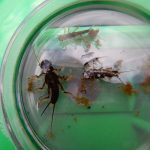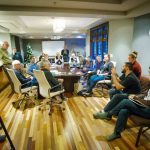STREAM program paused, closed CABIN trainings continue
Due to the current and evolving COVID-19 situation, Environment and Climate Change Canada, in cooperation with the Canadian Rivers Institute, has suspended the CABIN training program for 2020 (both online and field).
Living Lakes Canada has been working closely with the STREAM team to develop appropriate social distancing strategies and protocols for this field season. Although our courses in collaboration with participants in Whitehorse, Yukon; Kenora, Ontario; and Ottawa, Ontario have been postponed to 2021, many of the field certification courses within B.C. are still going forward. This field season we are collaborating with the:
- Binche Whut’en First Nation and the Firelight Group to host a closed CABIN training in Fort St. James for Nation members.
- Friends of Kootenay Lake to lead a closed CABIN course in Nelson, BC to support their Kootenay Lake tributaries monitoring project.
- Shuswap Indian Band members to host a CABIN training as part of the Columbia Wetlands Stewardship Partnership project. Living Lakes Canada will support trainees to monitor 15 tributaries to the Columbia Wetlands and collect DNA data alongside.
The University of Guelph is still closed due to COVID-19. At this time, 2019 STREAM samples are not being analyzed. This has caused a delay in reporting to 2019 STREAM partners.
We want to thank all our partners that are waiting patiently for their 2019 reports. We are asking that groups that are planning to sample for the 2020 field season ensure that they have enough freezer space to store all of their samples until the lab opens up. Once benthic samples have been preserved immediately after collection, they can last in the freezer for up to 6 months. It is not known when the University of Guelph will reopen to allow for sample analysis.
Further Reading
STREAM Frequently Asked Questions
Learn more about STREAM on our website.





